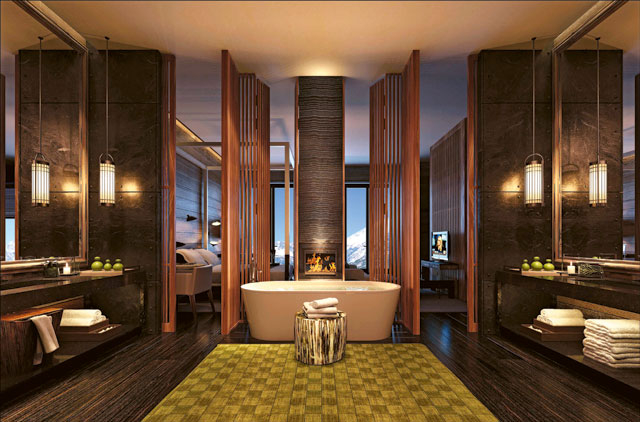Switzerland has always had a unique place in Europe. Although influenced by the policies of the European Union, which it has firmly stayed out of, the country maintains its Swiss-ness by means of referendums on almost every issue.
This also makes the country unique when it comes to inward investments, including in the property sector. The market was hit last year by the introduction of a new Lex Weber law, which imposes a 20 per cent ceiling on the number of second homes in any community, but it is slowly starting to recover, real estate agents say. “We are starting to see a much more active market in the past few months with confidence starting to return. It remains for now a buyers’ market while stock levels remain high,” says Alexander Koch de Gooreynd, Partner, International Residence Department at Knight Frank.
“In the principal home market, things have also been affected due to the upcoming vote in November on the future of the lump sum form of taxation. Both these legal and fiscal changes, alongside the effects of the global economic climate, have caused a major slowdown in activity for the past 18 months,” he adds.
Vote on lump sum tax
The lump sum tax, in force since 1862, is a levy on the living expenses of foreign residents that ignores their combined annual income and wealth. Since Zurich became the country’s first canton to abolish the system, nearly half its 201 lump sum beneficiaries left the canton — and some left Switzerland. The tax goes to a nationwide vote next month and some agents feel several homes could come on the market if wealthy residents decamp for other tax havens.
Swiss authorities have successfully slowed the growth of surging property prices, a UBS index showed in August, although the market remains at overheated levels, Reuters reported. The state provides no official data on the housing market.
Record-low interest rates and the arrival of wealthy residents had sent demand soaring over the past two years, and several measures, including a tightening of mortgage criteria, were introduced to ease conditions. Another factor influencing demand was banks’ decision to collaborate with US tax authorities last year.
De Gooreynd Alexander agrees prices are at an all-time high but states: ‘With as much as 30 per cent adjustments in certain areas, this is beginning to slow, while we are seeing more confidence from buyers who have been waiting to see what will happen. I do not envisage prices increasing for the foreseeable future but more of a stable environment returning in the coming months.”
Florian Steiger of the brokerage firm Steiger&Cie does not believe there is room for prices to fall further. “It is unlikely that prices will drop as it is a small market with a strong economy supporting it,” he says. “Access to the real estate market is also restricted for international buyers and [this] reduces investment opportunities for this category of investors.”
However, agents agree that there are many opportunities for buyers. Gregory Marchand, Administrator at John Taylor estate agents, says: “The market offers interesting opportunities but it is not a speculative market.”
Jeremy Rollason, Managing Director, Savills Alpine Homes, which is up 52 per cent year-on-year in terms of transactional volumes, believes those buying for the medium term will benefit. “The mainstream Swiss property market moves largely in line with GDP — currently circa 2 per cent,” says Rollason.
He adds: “Price appreciation over the next five years is inevitable in the leading ski resorts where there is a scarcity of property that may be purchased by non-Swiss residents.”
Steiger advises including property in a diversified portfolio as a defensive investment strategy focused on protection of capital.
Limitations
Foreigners, including those from the Middle East, are able to buy into Switzerland only under certain conditions. Only a total of 1,500 foreign buyer permits are available each year under so-called Lex Koller regulations. These are allocated to the touristic cantons or provinces on a first-come-first-serve basis, Rollason explains.
Foreigners must first establish fiscal residence in Switzerland, says Marchand. “Therefore you need to be a resident to buy a property,” he says. There are two exceptions: buying in a tourist area such as the Alps, or in the Montreux area. These are considered second homes, but must meet certain quota and size conditions. Alternatively, foreigners can buy commercial real estate as investment properties.
A third avenue is the newly introduced category of Residence Hoteliers, which allows international buyers to purchase a property that offers full hotel service on the condition that it is added to the rental pool when not in use. “This is not restricted to the holiday zones, so in theory we may start to see such products coming to the market in the city centres of both Geneva or Zurich within the next few years,” says de Gooreynd.
Those without a residency permit are allowed to reside in their property for a maximum of 180 days per year with a three-month maximum term per stay.
On the question of new developments or resorts presenting an attractive buyers’ opportunity, both Rollason and de Gooreynd suggested Andermatt, which is exempt from the regulations and allows purchase by all nationalities regardless of apartment size or the number of units purchased.
A $1.9 billion (about Dh6.9 billion) development project by the Egyptian billionaire Samih Sawiris is transforming the quiet Swiss village into an exciting ski resort with double its present population of 1,400. On the plan are six hotels, almost 500 condominiums in more than 40 buildings, 25 chalets, a golf course, an upgraded ski area and a modernised train station able to cope with the influx. With the opening last December of The Chedi Andermatt hotel, the area is swiftly emerging as an interesting opportunity, says de Gooreynd.





